Read more about
:quality(80)/business-review.eu/wp-content/uploads/2018/07/NEAN8283.jpg)
Reflecting Business Review’s strong focus on technology, the first event dedicated to blockchain, kicks off in Bucharest, at Impact Hub. A meeting platform for developers and investors, it brings together local and international speakers involved in the global blockchain community.
Valentin Necoara – CTO | certSIGN – Future of Identity & Blockchain
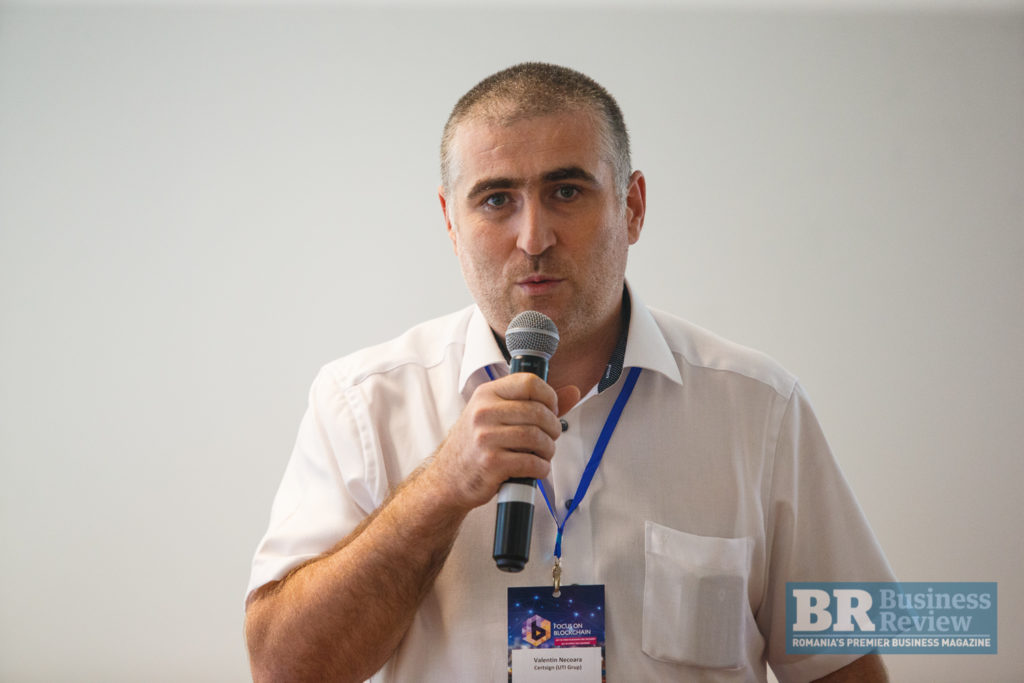
- certSIGN’s experience in guaranteeing identity
- More than 15 million certificates for the Romanian health insurance cards
- over 1 million qualified digital certificates released
- identity in blockchain – certify identity using KYC procedures – similar to what banks are using right now – we can create a blockchain environment with multiple parties guaranteeing the identity of a person – so it’s not necessarily to be identified by me, but via third parties it can be certified by others
- We can provide individual attributes for users – when a certificate is issued, we collect every information about the user according to the law
- Most of our users have connections with utilities companies, banks and sometimes governmental agencies, but there’s some reluctance in using blockchain in this area
- All use cases will require proving identity between to individuals — using the blockchain, I can sign a contract electronically with someone else and we don’t need to meet face-to-face to match the physical identity with the electronic one
- The information linked electronically will be enough to, say, go to the financial institution and show that you sold your car to another person, whose information has been confirmed through the blockchain as well. This ensures that if I use that information in legal papers, it would be enough.
- There is a lot of interest in banking regarding blockchain as well, because of the ability to have traceability of all actions – focus on delivering money to customers without the need of those customers being identified by going to the bank
- If the bank can identify you via blockchain they will be more than happy to give you credit based on it
Miklos Toth – Head of A.I. Projects | Blockchaineum – The Future of Tech: A.I. and Blockchain
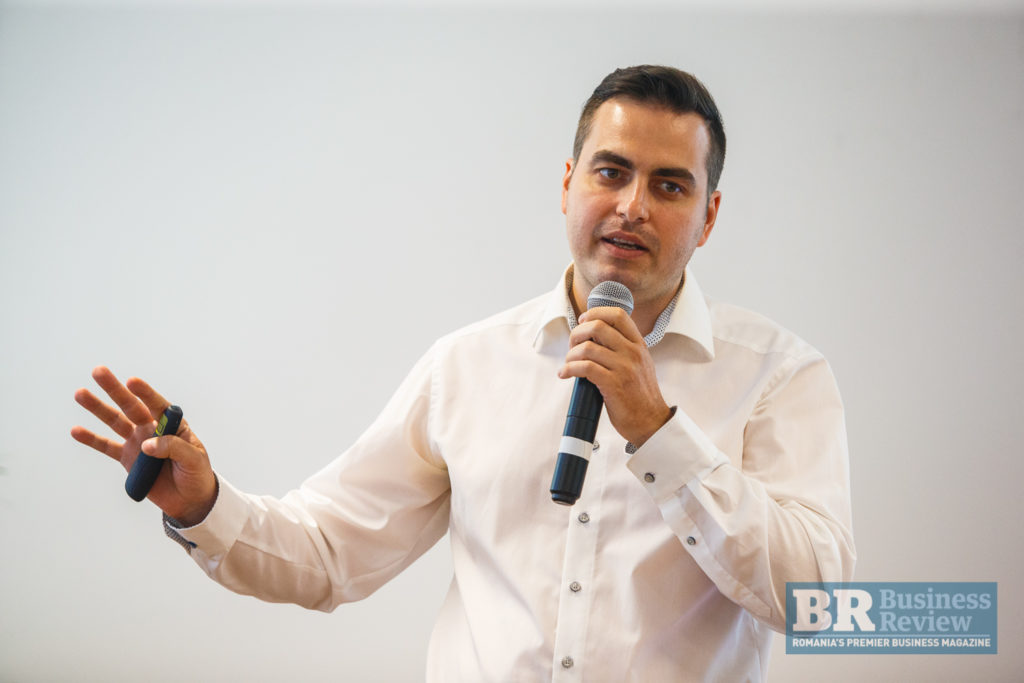
How to boost your AI project with blockchain
- The short answer is that there are many cases where blockchain can support AI projects
- Deep Learning
- Machine learning is actually a set of algorithms which can bring value to companies
- gems.org – a decentralized mechanical turk built on the Ethereum network; no identity needed, no existing bank infrastructure needed, better verification system, less redundant
- What if you have a good idea but you don’t have enough data?
- Solution: OpenMined
- Online platforms like Facebook are collecting data from its users and training a neural network with it
- What can you do if you don’t have enough computational power: the blockchain solution is the Deep Brain Chain – a renting system for GPUs – you need data, money and you just send them into the network and the GPU is used by your system to learn from the data – you get back the trained model and people get a reward for it
Cristian Orasanu – Product & Strategy | Emro Ventures – How some industries will look like and the society as a whole
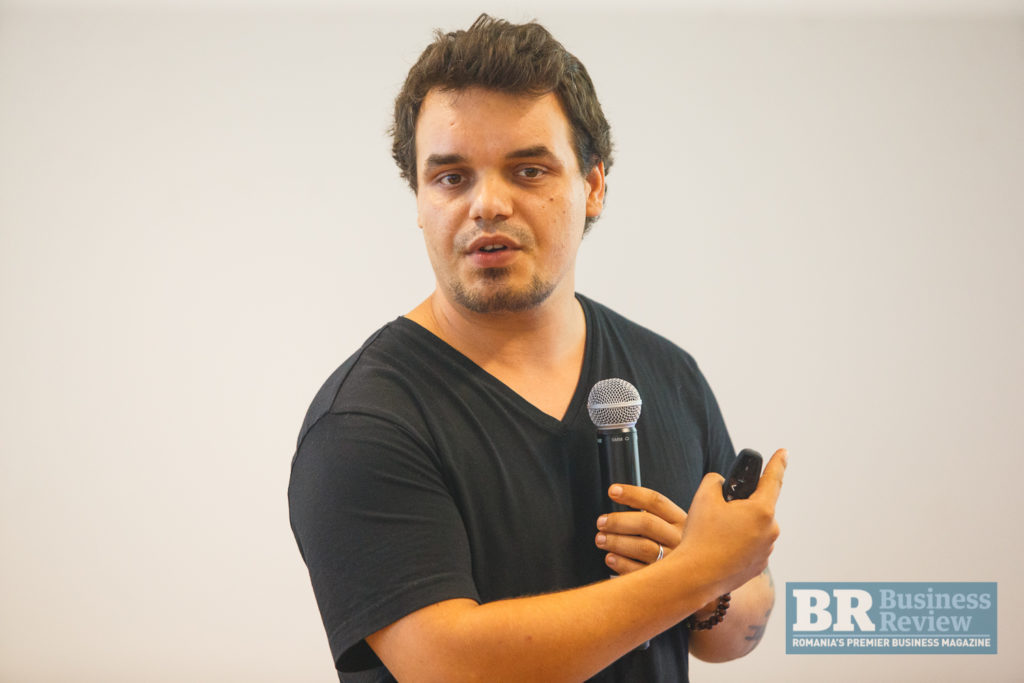
- First experience with blockchain – bought bitcoin in November 2013, at USD 514; sold at USD 508
- I want to bring it down a notch – my basic understanding is that blockchain is a distributed ledger, a decentralized database. What we build on it is only up to us. The best use case until now has been bitcoin
- Coin stats: 1,649 cryptocurrencies, 11,900 markets, USD 294 billion market cap, USD 20 billion daily volume, BTC dominance 43 percent.
- With this total market cap, we can certainly say it’s tangible, real, it has an impact
How many people know how money works? The answer is trust. If I have it and someone wants it, it’s valuable. If not, it has no value.
- There are some fundamental properties to the blockchain – replication; no central authority; irreversibility; accessibility; time-stamping; cryptography.
- In 1990, nobody knew what the internet was. The same thing is happening today with blockchain – we’re not in a boom yet
- Whoever survives the crisis is better suited for the future – it’s what happened with the dotcom bubble, the financial crisis and I think it will also happen next with new technologies
- Decentralized voting – blockchain enables trustless, tamper-proof voting systems, which can be used anywhere for politics & referendums
- Just because ICOs are used for scams doesn’t mean that all of them are useless and illegitimate
- Decentralized content delivery networks with built-in digital rights management – the biggest issue is privacy
- Banking inclusion – like cash, but digital and worldwide
- Legal contracts/bonds – use blockchain to store ownership, rights, obligations & check them against the consensus.
- What will the future hold? I truly believe that innovation – I love the concept but I despise the word, everybody’s using it – when you break it down, innovation is just a simple concept of whether you’ve bundled or unbundled something – have you brought to things together to create something new or have you deconstructed something to use in another way
Decentralised Business Models – Panel discussion
- How decentralization is creating new business models
- What are some of the most successful decentralized business models
- How do you go to market and scale?
- Monetizing Strategies
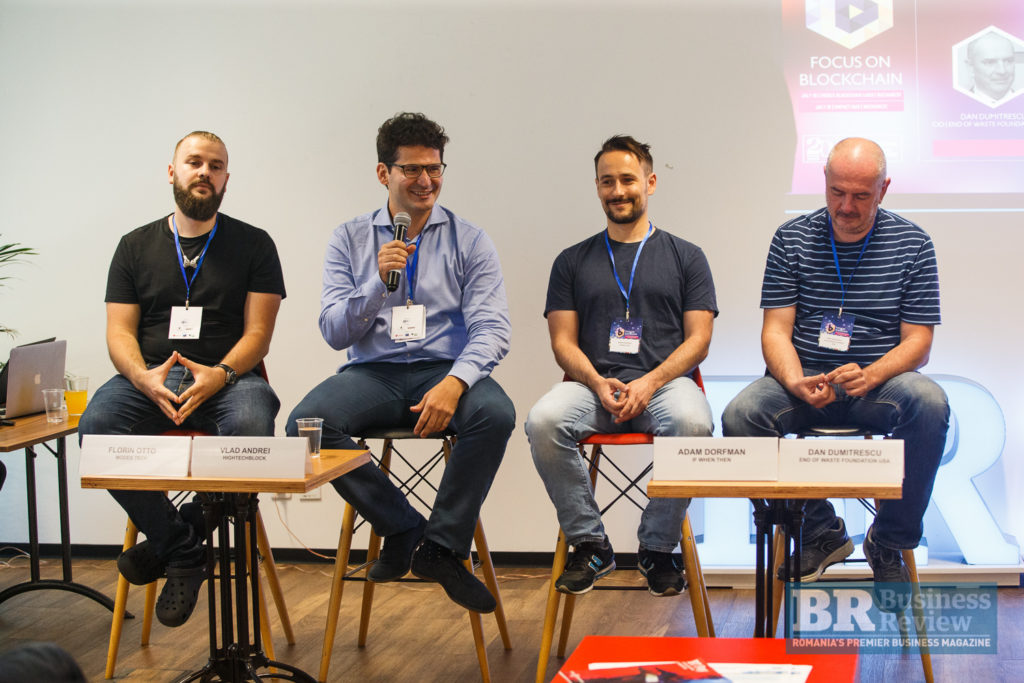
Moderator: Florin Otto – VP of Product | Modex Tech
Vlad Andrei – Co-Founder, CEO | HightechBlock

- When we have a business that makes a product, it may opt for a decentralized model. That is why we may have to split these worlds in pairs of two. I like the idea of decentralized interaction, not business models. They are linked.
- I don’t know any decentralized businesses that make money. Bitcoin is a decentralized business model that allows us to transfer value.
- We should try to see how decentralization creates new value and not just try to replicate existing products, it doesn’t work
- Centralized companies are having very large margins and in a way, technology is creating technology to reduce those markets.
- If we can build products that can bring value to users, we should do that, even if the infrastructure isn’t perfect – it’s never going to be perfect.
Adam Dorfman – Founder | If When Then
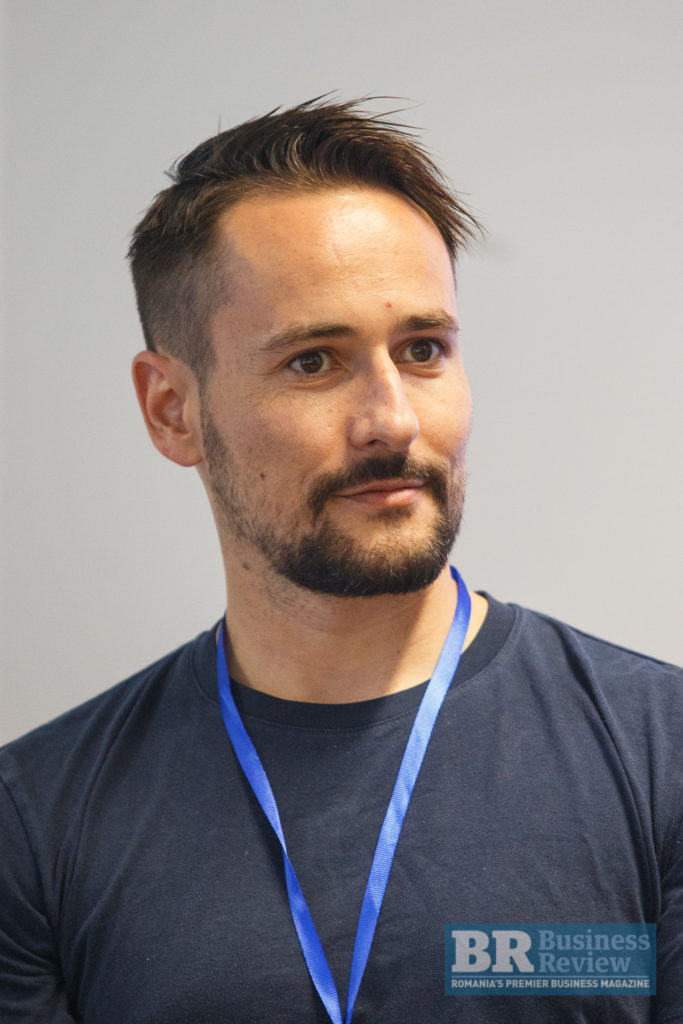
- Bitcoin is like digital gold. I know a lot about gold. It has a high purpose because physical gold is hard to move around and hard to store. It’s hard to purchase and it’s hard to split it up the way you can with digital currency. For me a lot of these projects have to find a higher purpose.
- A lot of people try to recreate Facebook or other successful ideas but they inevitably fail.
- Most money from ICOs has been raised from people in developing regions in the world. But the wrong business models are being selected as they’re just copying things that have already been done.
- You have to understand the problems of other people and try to solve them, think of global solutions not just local issues
- There’s a sweet spot between centralization and decentralization – you can’t completely go towards centralization or decentralization
- Blockchain companies have to first have purpose, and then they can show purpose with metrics
- In the restaurant business they say you need three positive experience before you have a customer for life – so user experience is very important.
- In our case, we’re not going to accept payments with our own tokens at first, either. Our ICO capital is going to be used for scholarships, converted into fiat in a closed model, where we can figure out what the main experience we have to focus on.
Dan Dumitrescu – CIO | End Of Waste Foundation USA

- Decentralization is useful against censorship. We’ve seen success in decentralizing in companies in fields such as gaming.
- A business delivers goods/services for money; an NGO does good things without expecting a profit. A decentralized business models can hypothetically mean that business disappears – just a decentralized network of individuals delivering things to each other, but it’s a long way until we get there, something like that may happen in the future
- I don’t know whether there’s any existing decentralized business model we can point to.
- Remember how websites looked in the 1990s? Ugly, slow, etc. Only a couple of geeks knew how to program a website. Now we have wordpress – everyone can build an option. That’s when we’ll have mass adoption of these new technologies – when it’s easy enough for our grandfathers to understand it.
Vlad Andrei – Co-Founder, CEO | HightechBlock – Token valuation frameworks
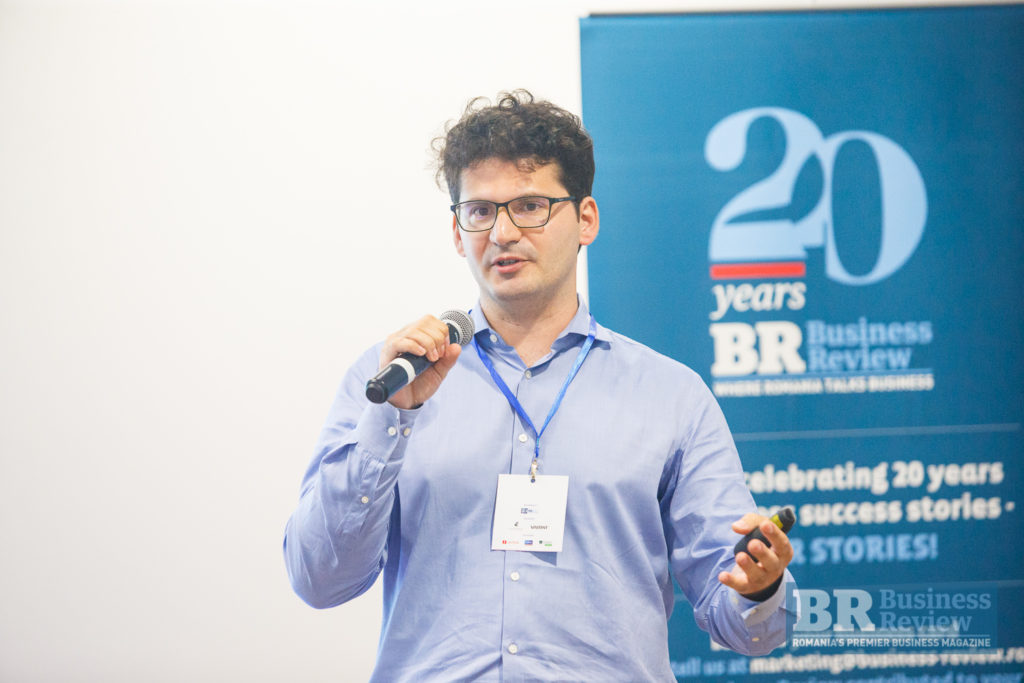
- Investing in companies vs. investing in cryptoassets
- People investing in cryptoassets have an incentive to promote the asset to others – if more people buy, the value may increase
- Companies: legal entities; profitability mechanism of selling products/services -company profits – dividends; valuation depends on current & expected company profitability; potential growth rate and appreciation is regular; intellectual property is an important, protected asset of the company; owners/investors capture most of the value created.
- For cryptoassets – profitability mechanism = network operations (i.e. miners) – utility cryptoassets don’t generate profits directly; valuation depends on size and usage of network. intellectual property is open source; users (for utility cryptoassets) capture most of the value created; potential growth rate and appreciation is larger (decentralization, virality).
Dan Dumitrescu – CIO | End Of Waste Foundation USA – Non Fungible Tokens – The missing link
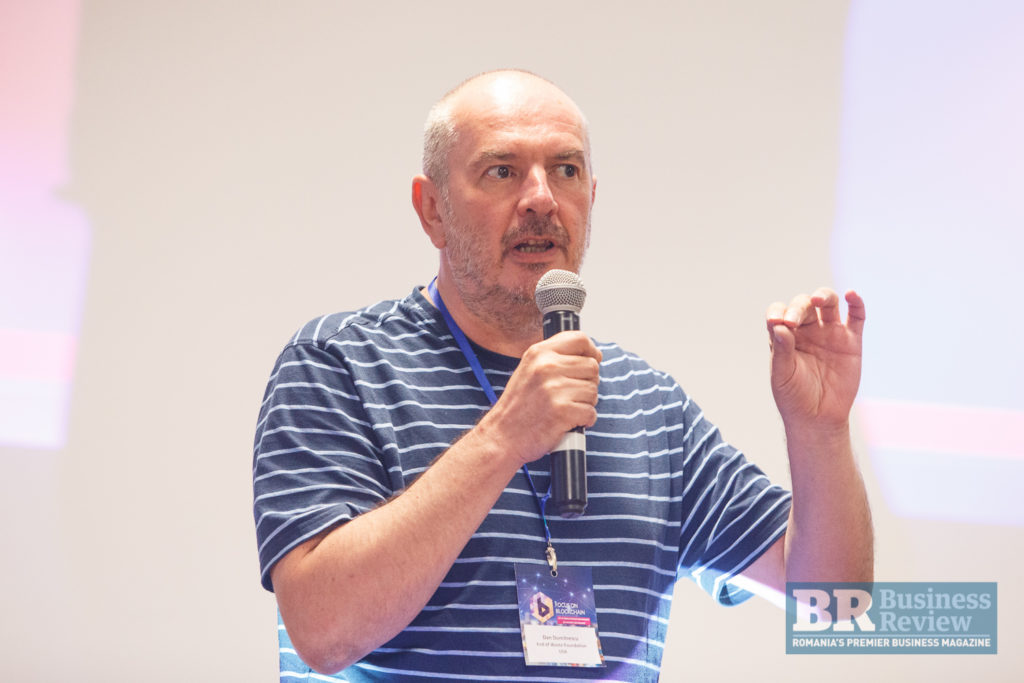
- I strongly believe that bitcoin is a new form of money, a better form, I would even say the best form – it’s solving the problem of eliminating intermediaries when we need to exchange value.
- What happens next? 2,000 altcoins later, I strongly believe we need something else.
- I want to tell you a short story – if you go to a restaurant after a wedding party and you only see the remains of the day, you don’t understand the happiness of the couple who just got married. I strongly believe than 10 years from now when we’ll look back at what happened today, we’ll see a turning point.
- Non-fungible tokens are the missing link – Fungible means interchangeable – We can exchange one bitcoin for another because they only store value. A non-fungible token doesn’t just store value, but also information, and can’t be split. In the future, our non-fungible tokens will be associated with our identity and they will be really useful.
- At End of Waste we’re trying to tokenize garbage and implement traceability from when the material entered the market to when it got recycled




:quality(80)/business-review.eu/wp-content/uploads/2024/04/Offline-vs.-Online-Wallet-Apps.jpg)




:quality(80)/business-review.eu/wp-content/uploads/2024/02/IMG_6951.jpg)

:quality(80)/business-review.eu/wp-content/uploads/2024/04/COVER-1.jpg)



:quality(80)/business-review.eu/wp-content/uploads/2024/04/cover-april.jpg)
:quality(50)/business-review.eu/wp-content/uploads/2023/03/business-review-buy-google-reviews.webp)
:quality(50)/business-review.eu/wp-content/uploads/2024/04/Rafaela-Nebreda-fondator-Imoteca.jpg)
:quality(50)/business-review.eu/wp-content/uploads/2024/04/Slide1.png)